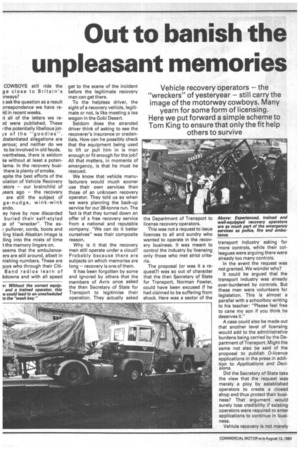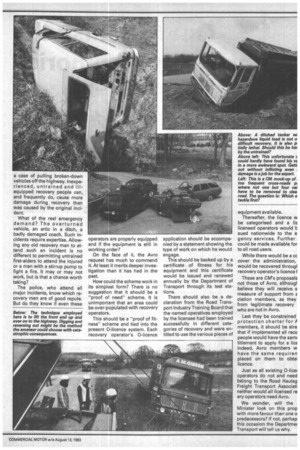Out to banish the unpleasant memories
Page 22

Page 23

If you've noticed an error in this article please click here to report it so we can fix it.
COWBOYS still ride the ge close to Britain's )rways?
task the question as a result )rrespondence we have re?d in recent weeks.
)t all of the letters we re?d were published. These I the potentially libellous jotl of the "goodies". Abstantiated allegations are lerous; and neither do we to be involved in old feuds. Ivertheless, there is seldom ke without at least a potenlame. In the recovery busithere is plenty of smoke. spite the best efforts of the iciation of Vehicle Recovery -ators — our brainchild of /ears ago — the recovery
are still the subject of ge-nudge, wink-wink and°.
ey have by now discarded buried their self-styled je of "wrecker". The expullover, cords, boots and ling black Alsatian image is Jing into the mists of time t the memory lingers on. seems that the ambulanceers are still around, albeit in nishing numbers. These are juys who through their CitiBand radios learn of kdowns and with all speed get to the scene of the incident before the legitimate recovery man can get there.
To the helpless driver, the sight of a recovery vehicle, legitimate or not, is like meeting a tea wagon in the Gobi Desert.
Seldom does the stranded driver think of asking to see the recoverer's insurance or credentials. How can he possibly check that the equipment being used to lift or pull him in is man enough or fit enough for the job? All that matters, in moments of emergency, is that he must be rescued.
We know that vehicle manufacturers would much sooner use their own services than those of an unknown recovery operator. They told us so when we were planning the back-up service for our 38-tonne run. The fact is that they turned down an offer of a free recovery service from a national and reputable company. "We can do it better ourselves" was their composite reason.
Why is it that the recovery men still operate under a cloud? Probably because there are subjects on which memories are long — recovery is one of them.
It has been forgotten by some and ignored by others that the members of Avro once asked the then Secretary of State for Transport to legitimise their operation. They actually asked the Department of Transport to license recovery operators.
This was not a request to issue licences to all and sundry who wanted to operate in the recovery business. It was meant to control the industry by licensing only those who met strict criteria.
The proposal (or was it a request?) was so out of character that the then Secretary of State for Transport, Norman Fowler, could have been excused if he had claimed to be suffering from shock. Here was a sector of the transport industry asking for more controls, while their colleagues were arguing there were already too many controls.
In the event the request was not granted. We wonder why?
It could be argued that the transport industry was already over-burdened by controls. But these men were volunteers for legislation. This is almost a parallel with a schoolboy writing to his teacher: "Please feel free to cane my son if you think he deserves it."
A case could also be made out that another level of licensing would add to the administrative burdens being carried by the Department of Transport. Might the same not also be said of the proposal to publish 0-licence applications in the press in addition to Applications and Decisions.
Did the Secretary of State take the view that the request was merely a ploy by established operators to create a closed shop and thus protect their business? That argument would surely lose credibility if existing operators were required to enter applications to continue in business.
Vehicle recovery is not merely a case of pulling broken-down vehicles off the highway. Inexperienced, untrained and illequipped recovery people can, and frequently do, cause more damage during recovery than was caused by the original incident.
What of the real emergency demand? The overturned vehicle, an artic in a ditch, a badly damaged coach. Such incidents require expertise. Allowing any old recovery man to attend such an incident is no different to permitting untrained first-alders to attend the injured or a man with a stirrup pump to fight a fire. It may or may not work, but is that a chance worth taking?
The police, who attend all major incidents, know which recovery men are of good repute. But do they know if even these operators are properly equipped and if the equipment is still in working order?
On the face of it, the Avro request has much to commend it. At least it merits deeper investigation than it has had in the past.
How could the scheme work in its simplest form? There is no suggestion that it should be a "proof of need" scheme. It is unimportant that an area could be over-populated with recovery operators.
This should be a "proof of fitness" scheme and tied into the present 0-licence system. Each recovery operator's 0-licence application should be accompanied by a statement showing the type of work on which he would engage.
This should be backed up by a certificate of fitness for his equipment and this certificate would be issued and renewed annually by the Department of Transport through its test stations.
There should also be a declaration from the Road Transport Industry Training Board that the named operatives employed by the licensee had been trained successfully in different categories of recovery and were entitled to use the various pieces of equipment available.
Thereafter, the licence w be categorised and a is licensed operators would b sued nationwide to the e gency services. Further could be made available for to all road users.
While there would be a cc cover the administration, would be recovered througl recovery operator's licence f
These are CM's proposals not those of Avro, althougt believe they will receive s measure of support from E ciation members, as they from legitimate recovery who are not in Avro.
Lest they be constrained protection charter for A members, it should be stre that if implemented all reco people would have the samo titlement to apply for a lies Indeed, Avro members w have the same requiren placed on them to obtai licence.
Just as all existing 0-licer operators do not and need belong to the Road Haulag Freight Transport Associati neither would all licensed re ery operators need Avro.
We wonder, will the Minister look on this prop with more favour than one o predecessors? If not, perhap this occasion the Departmer Transport will tell us why.
















































































